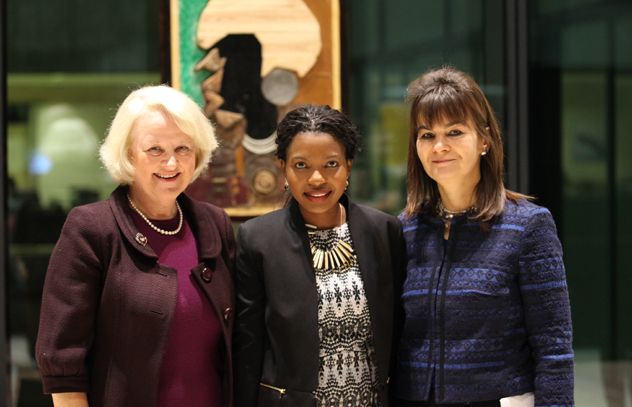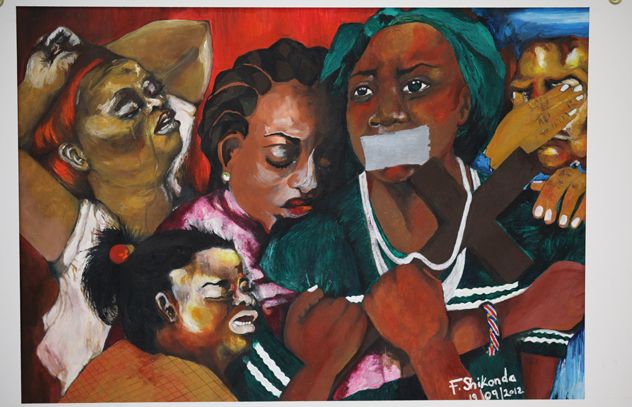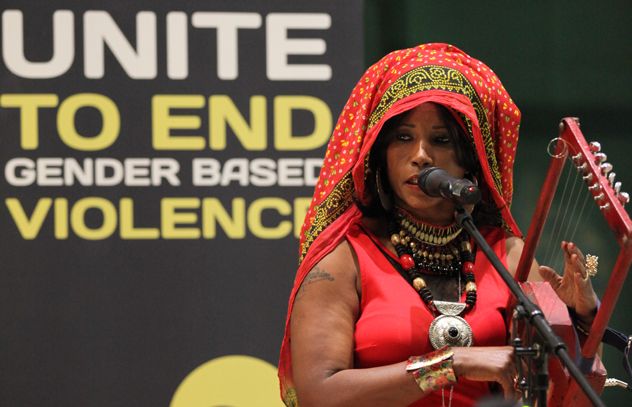

L to R: Jan Beagle, UNAIDS Deputy Executive Director, Management and Governance; Hem Matsi, Director of Victims2Survivors in Namibia; H.E. Ambassador Ms. Sabine Böhlke-Möller, Permanent Representative of Namibia to the United Nations Office in Geneva. Credit: UNAIDS

One of the artworks of the exhibition titled “Mother’s sorrow” by Findano Shikonda (Namibia). Credit: UNAIDS

Faytinga, star singer from Eritrea, performing at the opening of the exhibition. Credit: UNAIDS
Update
Breaking the silence around gender-based violence
11 December 2013
11 December 2013 11 December 2013The link between gender-based violence and HIV as both a cause and consequence of HIV is increasingly recognized. Studies show that women living with HIV are particularly vulnerable to sexual, physical and psychological violence, reporting violations of their sexual and reproductive rights, including coerced abortion and forced sterilization. Addressing gender-based violence is therefore critical to preventing new HIV infections and AIDS-related deaths.
Statistics from the World Health Organization around violence against women are compelling; globally, one in three women experience physical or sexual violence by a partner and 38% of all murders of women are committed by their intimate partners. In addition, up to 45% of adolescent girls around the world report that their first sexual experience was forced.
As in many other countries around the world, gender-based violence is widespread in Namibia. This type of violence is often invisible, as it frequently happens behind closed doors. Many survivors remain unknown and forgotten, hidden away in a society where gender-based violence generates a sense of shame among the victims, rather than among the perpetrators.
As part of efforts to eliminate gender-based violence in Namibia, the First Lady of Namibia, Mrs Penehupifo Pohamba, launched the ‘Unite to End Gender-based Violence’ art exhibition at the National Art Gallery of Namibia in June this year. The exhibition featured 60 works of art that were selected from over 200 submissions by Namibian artists, all centred around addressing gender-based violence.
The exhibition was part of an initiative organised by Ms Hem Matsi, Director of Victims2Survivors and a group of young people who climbed Mount Brandberg in April 2013, calling for the end of gender-based violence in Namibia. It showcases Namibia’s innovative and creative initiative to break the silence around gender-based violence and mobilize people and communities to join forces in eliminating gender-based violence.
Reaffirming shared commitment around eliminating gender-based violence, the Permanent Mission of Namibia to the United Nations in Geneva, Victims2Survivors, the National Art Gallery of Namibia and UNAIDS, have brought 24 works of art from the ‘Unite to end Gender-based Violence’ exhibition to Geneva to be displayed at UNAIDS Headquarters from the 10 to 20 December 2013.
The exhibition was opened by Ms Sabine Böhlke-Möller, Ambassador of Namibia to the United Nations Office in Geneva, Ms Jan Beagle, UNAIDS Deputy Executive Director, Management and Governance, Ms Hem Matsi, President of Victims2Survivors, and Ms Golda Ha-Eiros, Curator of the National Art Gallery of Namibia. The opening was held on 10 December to mark the final day of the annual 16 Days of Activism to end Gender-based Violence campaign and International Human Rights Day. The opening reception, which also featured a musical performance by Eritrean musician Faytinga, was attended by over 80 guests from diplomatic missions, international organisations, civil society representatives and UN staff.
Quotes
"Each of these pieces of art expresses differently the multidimensionality of the artist’s feelings; better than words could describe it. Even if the theme is a tragic and sad one, I believe that you will appreciate the message behind it and support us in our endeavor to realize the full potential of women and their enjoyment of human rights and fundamental freedoms."
"It is clear––we cannot be neutral and we cannot be silent when it comes to ending AIDS and violence against women. Each and every one of us has a role to play in creating a world where all women are able to reach their full potential in safe and equitable environments."
“Art is a powerful medium. That is why we took advantage and initiated the Unite to End Gender based violence art exhibition with the aim to educate, share experiences, involve youth and raise awareness on gender violence in Namibia and the world”



